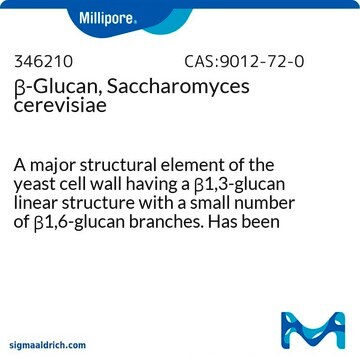67138
β-(1→3)-D-Glucanase from Helix pomatia
≥0.2 U/mg
Se connecterpour consulter vos tarifs contractuels et ceux de votre entreprise/organisme
About This Item
Produits recommandés
Source biologique
Helix pomatia
Niveau de qualité
Forme
powder
Activité spécifique
≥0.2 U/mg
Température de stockage
−20°C
Vous recherchez des produits similaires ? Visite Guide de comparaison des produits
Application
β-(1→3)-D-Glucanase from is used to digest β -1,3-glucan, which is a major component of cell walls. β-(1→3)-D-Glucanase from Helix pomatia has been used fto digest the cell walls of C. albicans .
Actions biochimiques/physiologiques
Deletion of the C.albicans histidine kinase gene (CHK1) improves recognition by phagocytes through an increased exposure of cell wall b-1,3-glucans, which are readily digested by β-(1→3)-D-Glucanases .
Conditionnement
Bottomless glass bottle. Contents are inside inserted fused cone.
Définition de l'unité
One unit corresponds to the amount of enzyme which liberates 1 μmol of glucose from laminarin (Cat. No. 61340) per minute at pH 5.0 and 37 °C
Mention d'avertissement
Danger
Mentions de danger
Conseils de prudence
Classification des risques
Resp. Sens. 1
Code de la classe de stockage
11 - Combustible Solids
Classe de danger pour l'eau (WGK)
WGK 1
Point d'éclair (°F)
Not applicable
Point d'éclair (°C)
Not applicable
Certificats d'analyse (COA)
Recherchez un Certificats d'analyse (COA) en saisissant le numéro de lot du produit. Les numéros de lot figurent sur l'étiquette du produit après les mots "Lot" ou "Batch".
Déjà en possession de ce produit ?
Retrouvez la documentation relative aux produits que vous avez récemment achetés dans la Bibliothèque de documents.
Les clients ont également consulté
Linglin Wan et al.
Planta, 233(2), 309-323 (2010-11-04)
Plant β-1,3-glucanases are involved in plant defense and development. In rice (Oryza sativa), 14 genes encoding putative β-1,3-glucanases have been isolated and sequenced. However, only limited information is available on the function of these β-1,3-glucanase genes. In this study, we
Julieta V Cabello et al.
The Plant journal : for cell and molecular biology, 69(1), 141-153 (2011-09-09)
Plants deal with cold temperatures via different signal transduction pathways. The HD-Zip I homologous transcription factors HaHB1 from sunflower and AtHB13 from Arabidopsis were identified as playing a key role in such cold response. The expression patterns of both genes
Amanda R Sena et al.
Anais da Academia Brasileira de Ciencias, 83(2), 599-609 (2011-06-01)
The enzyme glucanase from Moniliophthora perniciosa was produced in liquid medium and purified from the culture supernatant. A multivariate statistical approach (Response Surface Methodology - RSM) was employed to evaluate the effect of variables, including inducer (yeast extract) and fermentation
Marián Mazáň et al.
The Biochemical journal, 438(2), 275-282 (2011-06-10)
BGTs [β-(1,3)-glucanosyltransglycosylases; EC 2.4.1.-] of the GH72 (family 72 of glycosylhydrolases) are GPI (glycosylphosphatidylinositol)-anchored proteins that play an important role in the biogenesis of fungal cell walls. They randomly cleave glycosidic linkages in β-(1,3)-glucan chains and ligate the polysaccharide portions
Enrico Cabib et al.
Eukaryotic cell, 11(4), 388-400 (2012-03-01)
Previous results suggested that the chitin ring present at the yeast mother-bud neck, which is linked specifically to the nonreducing ends of β(1-3)glucan, may help to suppress cell wall growth at the neck by competing with β(1-6)glucan and thereby with
Notre équipe de scientifiques dispose d'une expérience dans tous les secteurs de la recherche, notamment en sciences de la vie, science des matériaux, synthèse chimique, chromatographie, analyse et dans de nombreux autres domaines..
Contacter notre Service technique










